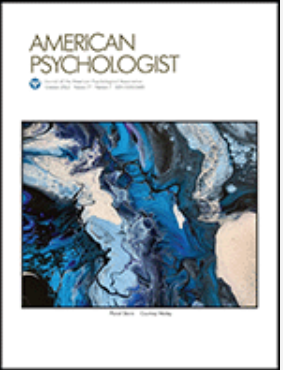美国心理学会关于使用 "白人 "或 "欧洲人 "的建议:答复 Moffitt 和 Juang (2024)。
IF 12.3
1区 心理学
Q1 PSYCHOLOGY, MULTIDISCIPLINARY
引用次数: 0
摘要
美国心理学会于 2023 年底发布了第二版《包容性语言指南》。与第一版相比,"白人 "或 "欧美人 "的使用指南没有变化。在本答复中,我们提供了在学术和政策讨论中为了简洁而交替使用 "白人 "和 "欧洲人 "的理由。不过,简洁性不应优先于准确性或具体性。本建议还旨在解释使用 "欧美人 "而非 "白人 "标签如何有助于采纳多元文化主义观点,最终减少种族和民族偏见。(PsycInfo Database Record (c) 2024 APA, all rights reserved)。本文章由计算机程序翻译,如有差异,请以英文原文为准。
American Psychological Association's recommendation on the use of the terms "White" or "European": Reply to Moffitt and Juang (2024).
The American Psychological Association released its second edition of the Inclusive Language Guide in late 2023. The guidance on the use of the terms "White" or "European American" did not change from the first edition. In this reply, we provide the rationale for using the terms "White" and "European" interchangeably for brevity in academic and policy discussions. Nonetheless, brevity should not be prioritized over accuracy or specificity. This recommendation also aims to explain how the use of "European American" labels instead of "White" can contribute to the adoption of multiculturalist views, ultimately reducing racial and ethnic prejudice. (PsycInfo Database Record (c) 2024 APA, all rights reserved).
求助全文
通过发布文献求助,成功后即可免费获取论文全文。
去求助
来源期刊

American Psychologist
PSYCHOLOGY, MULTIDISCIPLINARY-
CiteScore
18.50
自引率
1.20%
发文量
145
期刊介绍:
Established in 1946, American Psychologist® is the flagship peer-reviewed scholarly journal of the American Psychological Association. It publishes high-impact papers of broad interest, including empirical reports, meta-analyses, and scholarly reviews, covering psychological science, practice, education, and policy. Articles often address issues of national and international significance within the field of psychology and its relationship to society. Published in an accessible style, contributions in American Psychologist are designed to be understood by both psychologists and the general public.
 求助内容:
求助内容: 应助结果提醒方式:
应助结果提醒方式:


